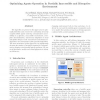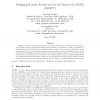153 search results - page 19 / 31 » Modeling Motivations and Emotions as a Basis for Intelligent... |
IAT
2005
IEEE
14 years 1 months ago
2005
IEEE
The algorithm we present in this paper aims to optimally distribute and connect the community of loosely coupled middle agents ensuring communication accessibility in a dynamic, i...
CVPR
2003
IEEE
14 years 9 months ago
2003
IEEE
Understanding human emotions is one of the necessary skills for the computer to interact intelligently with human users. The most expressive way humans display emotions is through...
MAGS
2007
13 years 7 months ago
2007
AKIRA is an open source framework designed for parallel, asynchronous and distributed computation, on the basis of some general architectural principles which are inspired by modu...
EEMMAS
2007
Springer
14 years 1 months ago
2007
Springer
One motivation for many agent-based models is to predict the future. The nonlinearity of agent interactions in most non-trivial domains mean that the usefulness of such prediction...
GECCO
2005
Springer
14 years 1 months ago
2005
Springer
This article describes a mathematical framework for characterizing cooperativity in complex systems subject to evolutionary pressures. This framework uses three foundational compo...


